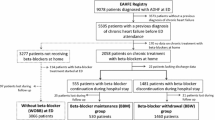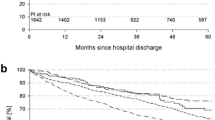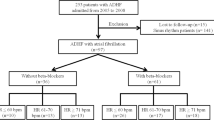Abstract
Clinical practice guidelines emphasize that optimal pharmacotherapy, including beta-blockers (BB), is a prerequisite before receiving cardiac resynchronization therapy (CRT) in eligible patients with heart failure (HF). However, the optimal dose of BB before CRT implantation cannot be tolerated in a number of patients. Sixty-three consecutive patients who underwent CRT in 2006–2013 were retrospectively investigated. Before receiving CRT, BB could not be introduced in 20 patients (32 %); the daily carvedilol-equivalent dose in other 43 patients was 5.6 ± 7.0 mg because of significant HF and bradycardia. After receiving CRT, BB could be introduced in almost all patients (n = 61, 97 %), and the daily BB dose increased from 5.6 ± 7.0 to 13.2 ± 7.8 mg (P < 0.001). Multivariate analysis indicated that the change of BB dose after CRT was independently associated with improved left ventricular end-systolic volume (LVESV) [β = −0.36; 95 % confidence interval (CI) −2.13 to −0.45; P < 0.01] after 6-months follow-up. Furthermore, Cox proportional hazard analysis also showed that the change in the BB dose (hazard ratio, 0.92; 95 % CI, 0.87–0.98; P < 0.01) as well as the New York Heart Association functional classification was an independent predictor of cardiac events. After initiating CRT, BB therapy can be introduced and up-titrated in intolerant HF patients. The up-titrated dose of BB after CRT was an independent predictor for the improvement of LVESV and HF prognosis.

Similar content being viewed by others
References
Cleland JG, Daubert JC, Erdmann E, Freemantle N, Gras D, Kappenberger L, Tavazzi L, Cardiac Resynchronization-Heart Failure Study Investigators (2005) The effect of cardiac resynchronization on morbidity and mortality in heart failure. N Engl J Med 352:1539–1549
Knackstedt C, Arndt M, Mischke K, Marx N, Nieman F, Kunert HJ, Schauerte P, Norra C (2014) Depression, psychological distress, and quality of life in patients with cardioverter defibrillator with or without cardiac resynchronization therapy. Heart Vessels 29:364–374
Tracy CM, Epstein AE, Darbar D, DiMarco JP, Dunbar SB, Estes NA 3rd, Ferguson TB Jr, Hammill SC, Karasik PE, Link MS, Marine JE, Schoenfeld MH, Shanker AJ, Silka MJ, Stevenson LW, Stevenson WG, Varosy PD, Ellenbogen KA, Freedman RA, Gettes LS, Gillinov AM, Gregoratos G, Hayes DL, Page RL, Stevenson LW, Sweeney MO, American College of Cardiology, Foundation American Heart Association Task Force on Practice, Guidelines Heart Rhythm, Society (2012) 2012 ACCF/AHA/HRS focused update of the 2008 guidelines for device-based therapy of cardiac rhythm abnormalities: a report of the American College of Cardiology Foundation/American Heart Association Task Force on Practice Guidelines and the Heart Rhythm Society. [corrected]. Circulation 126:1784–1800
Yancy CW, Jessup M, Bozkurt B, Butler J, Casey DE Jr, Drazner MH, Fonarow GC, Garaci SA, Horwich T, Januzzi JL, Johnson MR, Kasper EK, Levy WC, Masoudi FA, McBride PE, McMurray JJ, Mitchell JE, Peterson PN, Riegel B, Sam F, Stevenson LW, Tang WH, Tsai EJ, Wilkoff BL (2013) 2013 ACCF/AHA guideline for the management of heart failure: a report of the American College of Cardiology Foundation/American Heart Association Task Force on practice guidelines. Circulation 128:e240–e327
CIBIS-II Investigators and Committees (1999) The Cardiac Insufficiency Bisoprolol Study II (CIBIS-II): a randomised trial. Lancet 353:9–13
Gottlieb SS, Fisher ML, Kjekshus J, Deedwania P, Gullestad L, Vitovec J, Wikstrand J, Merit-Hf Investigators (2002) Tolerability of beta-blocker initiation and titration in the Metoprolol CR/XL Randomized Intervention Trial in Congestive Heart Failure (MERIT-HF). Circulation 105:1182–1188
Packer M, Fowler MB, Roecker EB, Coats AJ, Katus HA, Krum H, Mohacsi P, Rouleau JL, Tendera M, Staiger C, Holcslaw TL, Amann-Zalan I, DeMets DL, Carvedilol Prospective Randomized Cumulative Survival Study Group (2002) Effect of carvedilol on the morbidity of patients with severe chronic heart failure: results of the carvedilol prospective randomized cumulative survival (COPERNICUS) study. Circulation 106:2194–2199
Patel P, White DL, Deswal A (2007) Translation of clinical trial results into practice: temporal patterns of beta-blocker utilization for heart failure at hospital discharge and during ambulatory follow-up. Am Heart J 153:515–522
Hauptman PJ, Swindle JP, Masoudi FA, Burroughs TE (2010) Underutilization of beta-blockers in patients undergoing implantable cardioverter-defibrillator and cardiac resynchronization procedures. Circ Cardiovasc Qual Outcomes 3:204–211
JCS Joint Working Group (2013) Guidelines for treatment of acute heart failure (JCS 2011). Circ J 77(8):2157–2201
Poole-Wilson PA, Swedberg K, Cleland JG, Di Lenarda A, Hanrath P, Komajda M, Lubsen J, Lutiger B, Metra M, Remme WJ, Torp-Pedersen C, Scherhag A, Skene A, Carvedilol Or Metoprolol Eupopean Trial, Investigators (2003) Comparison of carvedilol and metoprolol on clinical outcomes in patients with chronic heart failure in the Carvedilol Or Metoprolol European Trial (COMET): randomised controlled trial. Lancet 362:7–13
Düngen HD, Apostolović S, Inkrot S, Tahirović E, Krackhardt F, Pavlović M, Putnikovic B, Lainscak M, Gelbrich G, Edelmann F, Wachter R, Eschenhagen T, Waagstein F, Follath F, Rauchhaus M, Haverkamp W, Osterziel KJ, Dietz R, Cibis-Eld Investigators (2008) Subproject Multicenter Trials in the Competence Network Heart Failure. Bisoprolol vs. carvedilol in elderly patients with heart failure: rationale and design of the CIBIS-ELD trial. Clin Res Cardiol 97:578–586
Ikeda Y, Inomata T, Iida Y, Iwamoto-Ishida M, Nabeta T, Ishii S, Sato T, Yanagisawa T, Mizutani T, Naruke T, Koitabashi T, Takeuchi I, Nishii M, Ako J (2015) Time course of left ventricular reverse remodeling in response to pharmacotherapy: clinical implication for heart failure prognosis in patients with idiopathic dilated cardiomyopathy. Heart Vessels. doi:10.1007/s00380-015-0648-2
Grosu A, Senni M, Iacovoni A, Gori M, Cantu F, Bisetti S, De Santo T, De Luca A, Gavazzi A (2011) CArdiac resynchronization in combination with beta blocker treatment in advanced chronic heart failure (CARIBE-HF): the results of the CARIBE-HF study. Acta Cardiol 66:573–580
Komajda M, Lapuerta P, Hermans N, Gonzalez-Juanatey JR, van Veldhuisen DJ, Erdmann E, Tavazzi L, Poole-Wilson P, Le Pen C (2005) Adherence to guidelines is a predictor of outcome in chronic heart failure: the MAHLER survey. Eur Heart J 26:1653–1659
Ohsaka T, Inomata T, Naruke T, Shinagawa H, Koitabashi T, Nishii M, Takeuchi I, Takehana H, Izumi T (2008) Clinical impact of adherence to guidelines on the outcome of chronic heart failure in Japan. Int Heart J 49:59–73
Adelstein E, Bhattacharya S, Simon MA, Gorcsan J 3rd, Saba S (2011) Comparison of outcomes for patients with nonischemic cardiomyopathy taking intravenous inotropes versus those weaned from or never taking inotropes at cardiac resynchronization therapy. Am J Cardiol 110:857–861
Heywood JT, Fonarow GC, Yancy CW, Albert NM, Curtis AB, Gheorghiade M, Inge PJ, McBride ML, Mehra MR, O’Connor CM, Reynolds D, Walsh MN (2010) Comparison of medical therapy dosing in outpatients cared for in cardiology practices with heart failure and reduced ejection fraction with and without device therapy: report from IMPROVE HF. Circ Heart Fail 3:596–605
Tang AS, Wells GA, Talajic M, Arnold MO, Sheldon R, Connolly S, Hohnloser SH, Nichol G, Birnie DH, Sapp JL, Yee R, Healey JS. Rouleau JL, Resynchronization-Defibrillation for Ambulatory Heart Failure Trial Investigators (2010) Cardiac-resynchronization therapy for mild-to-moderate heart failure. N Eng J Med 363:2385–2395
Goldenberg I, Moss AJ, Hall WJ, Foster E, Goldberger JJ, Santucci P, Shinn T, Solomon S, Steinberg JS, Wilber D, Barsheshet A, McNitt S, Zareba W, Klein H, Committee Madit-Crt Executive (2011) Predictors of response to cardiac resynchronization therapy in the Multicenter Automatic Defibrillator Implantation Trial with Cardiac Resynchronization Therapy (MADIT-CRT). Circulation 124:1527–1536
Bristow MR, Saxon LA, Boehmer J, Krueger S, Kass DA, De Marco T, Carson P, DiCarlo L, DeMets D, White BG, DeVries DW, Feldman AM, Comparison of Medical Therapy, Pacing Defibrillation in Heart Failure, Investigators (2004) Cardiac-resynchronization therapy with or without an implantable defibrillator in advanced chronic heart failure. N Engl J Med 350:2140–2150
Aranda JM Jr, Woo GW, Conti JB, Schofield RS, Conti CR, Hill JA (2005) Use of cardiac resynchronization therapy to optimize beta-blocker therapy in patients with heart failure and prolonged QRS duration. Am J Cardiol 95:889–891
Kachboura S, Ben Halima A, Ibn Elhadj Z, Marrakchi S, Chrigui R, Kammoun I, Chine S, Lefi A (2014) Cardiac resynchronization therapy allows the optimization of medical treatment in heart failure patients. Ann Cardiol Angeiol (Paris) 63:17–22
Van Bommel RJ, Delgado V, Schalij MJ, Bax JJ (2010) Critical appraisal of the use of cardiac resynchronization therapy beyond current guidelines. J Am Coll Cardiol 56:754–762
Achilli A, Peraldo C, Sassara M, Orazi S, Bianchi S, Laurenzi F, Donati R, Perego GB, Spampinato A, Valsecchi S, Denaro A, Puglisi A, Scart Study Investigators (2006) Prediction of response to cardiac resynchronization therapy: the selection of candidates for CRT (SCART) study. Pacing Clin Electrophysiol 29 (Suppl 2):S11–S19
Bardy GH, Lee KL, Mark DB, Poole JE, Packer DL, Boineau R, Domanski M, Troutman C, Anderson J, Johnson G, McNulty SE, Clapp-Channing N, Davidson-Ray LD, Fraulo ES, Fishbein DP, Luceri RM, Ip JH, Sudden Cardiac Death in Heart Failure Trial, Investigators (2005) Amiodarone or an implantable cardioverter-defibrillator for congestive heart failure. N Engl J Med 352:225–237
Voigt A, Shalaby A, Adelstein E, Saba S (2010) Beta-blocker utilization and outcomes in patients receiving cardiac resynchronization therapy. Clin Cardiol 33:E1–E5
Ruwald MH, Ruwald AC, Jons C, Alexis J, McNitt S, Zareba W, Moss AJ (2013) Effect of metoprolol versus carvedilol on outcomes in MADIT-CRT (multicenter automatic defibrillator implantation trial with cardiac resynchronization therapy). J Am Coll Cardiol 61:1518–1526
Shen X, Nair CK, Aronow WS, Hee T, Esterbrooks DJ (2013) Effect of carvedilol versus metoprolol CR/XL on mortality in patients with heart failure treated with cardiac resynchronization therapy: a COX multivariate regression analysis. Am J Ther 20:247–253
Phillips CO, Wright SM, Kern DE, Singa RM, Shepperd S, Rubin HR (2004) Comprehensive discharge planning with postdischarge support for older patients with congestive heart failure: a meta-analysis. JAMA 291:1358–1367
Mullens W, Grimm RA, Verga T, Dresing T, Starling RC, Wilkoff BL, Tang WHW (2009) Insights from a cardiac resynchronization optimization clinic as part of a heart failure disease management program. J Am Coll Cardiol 53:765–773
Castel MA, Magnani S, Mont L, Roig E, Tamborero D, Méndez-Zurita F, Femenia JF, Tolosana JM, Perez-Villa F, Brugada J (2010) Survival in New York Heart Association class IV heart failure patients treated with cardiac resynchronization therapy compared with patients on optimal pharmacological treatment. Europace 12:1136–1140
Adelstein E, Bhattacharya S, Simon MA, Gorcsan J 3rd, Saba S (2012) Comparison of outcomes for patients with nonischemic cardiomyopathy taking intravenous inotropes versus those weaned from or never taking inotropes at cardiac resynchronization therapy. Am J Cardiol 110:857–861
Milliez P, Thomas O, Haggui A, Schurando P, Squara P, Cohen-Solal A, Mebazza A, Leenhardt A (2008) Cardiac resynchronisation as a rescue therapy in patients with catecholamine-dependent overt heart failure: results from a short and mid-term study. Eur J Heart Fail 10:291–297
Tang WH, Francis GS (2007) Cardiac resynchronization therapy in New York Heart Association class IV heart failure: it is all about selection. Circulation 115:161–162
Acknowledgments
None.
Conflict of interest
The authors declare that there is no conflict of interest.
Author information
Authors and Affiliations
Corresponding author
Rights and permissions
About this article
Cite this article
Nabeta, T., Inomata, T., Iida, Y. et al. Prognostic significance of beta-blocker up-titration in conjunction with cardiac resynchronization therapy in heart failure management. Heart Vessels 31, 1109–1116 (2016). https://doi.org/10.1007/s00380-015-0711-z
Received:
Accepted:
Published:
Issue Date:
DOI: https://doi.org/10.1007/s00380-015-0711-z




